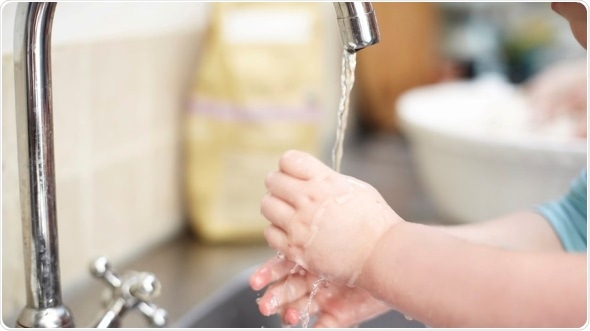Researchers from the University of Sheffield and King’s College London have discovered that exposing the skin to hard water damages the skin barrier – which is our defense against outside threats such as bacteria or sun burn – and increases the sensitivity of the skin to potential irritants found in everyday wash products such as soap or washing powder.

Hard water contains high levels of calcium and magnesium ions that bind to surfactants such as sodium lauryl sulfate (SLS) and sodium lauryl ether sulfate (SLES) – which act as detergents or wetting agents – making them insoluble, so they precipitate onto the skin.
Skin pH is normally acidic but hard water has high alkalinity which means it can raise the skin surface pH. A shift towards alkaline pH disturbs the skin’s natural function as a physical barrier and leaves it prone to colonization by potentially pathogenic bacteria which can cause infection.
Lead author of the study, Dr Simon Danby from the University of Sheffield’s Department of Infection, Immunity and Cardiovascular Disease, said:
By damaging the skin barrier, washing with hard water may contribute to the development of eczema – a chronic skin condition characterized by an intensely itchy red rash.
Patients with eczema are much more sensitive to the effects of hard water than people with healthy skin. This increase in sensitivity is associated with a genetic predisposition to a skin barrier defect brought about by mutations in the gene encoding filaggrin. Filaggrin is a structural protein important for the formation of our skin’s barrier to the outside environment. Up to half of all people with eczema carry a filaggrin gene.
This new study reveals the mechanism by which calcium and magnesium ions in hard water, surfactants, and filaggrin interact to damage the skin barrier unlocking new information about how exposure to hard water could potentially contribute to the development of eczema.
This week (16-24 September 2017) marks National Eczema Week.
Symptoms of eczema (also called ‘atopic eczema’ or ‘atopic dermatitis’) include inflamed, dry skin and often secondary skin infections, which can affect any part of the body and every aspect of a person’s life – both physically and emotionally.
The new study, which Harvey Water Softeners was asked to fund, was published this week (16 September 2017) in the Journal of Investigative Dermatology. The team of researchers examined whether removing the calcium and magnesium ions using an ion-exchange water softener could mitigate the negative effects of hard water on the skin. They found that using a water softener reduces the harmful effects of surfactants, potentially decreasing the risk of developing eczema.
Managing director of Harvey Water Softeners, Martin Hurworth, said:
The link between hard water and eczema has been reported anecdotally for years - now for the first time there’s academic proof. We were pleased to provide industry support to this study in the form of hard water samples and the twin-cylinder water softeners that provided the softened water that was needed.
Co-senior author of the study, Dr Carsten Flohr from the St John’s Institute of Dermatology at Guy’s and St Thomas’ NHS Foundation Trust and King’s College London, said:
One in five children and one in 12 adults in the UK suffer from eczema, costing the NHS well over £500 million annually.
It is during the first few days and months of life that our skin is most susceptible to damage and most at risk of developing eczema.
For that reason we are now embarking on a pilot trial to investigate whether installation of a domestic water softener around the time of birth can prevent skin barrier breakdown and eczema in those living in hard water areas.
The Softened Water for Eczema Prevention (SOFTER) trial will be undertaken by Dr Flohr and his team from King’s College London and the National Institute for Health Research (NIHR) Biomedical Research Centre at Guy’s & St Thomas’ NHS Foundation Trust in collaboration with the University of Sheffield team and colleagues from the University of Dundee, the Center of Evidence-Based Dermatology at Nottingham University, Imperial College London, the National Institute for Health (Bethesda, USA), and Amsterdam Medical Center.
Eczema Study